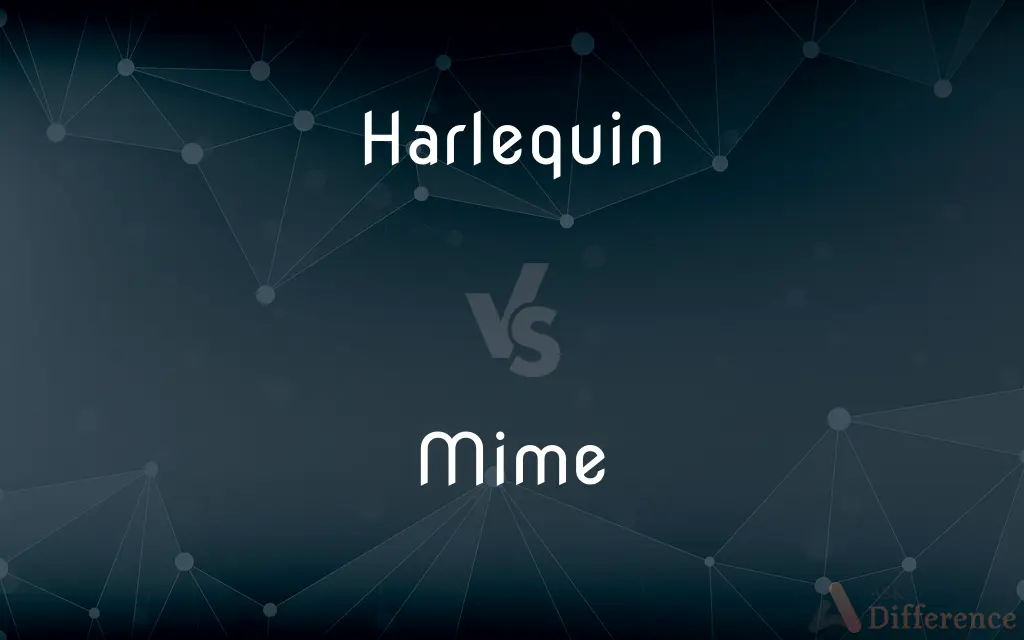Harlequin vs. Mime — What's the Difference?

Difference Between Harlequin and Mime
ADVERTISEMENT
Compare with Definitions
Harlequin
Harlequin (; Italian: Arlecchino [arlekˈkiːno]) is the best-known of the zanni or comic servant characters from the Italian commedia dell'arte. The role is traditionally believed to have been introduced by Zan Ganassa in the late 16th century, was definitively popularized by the Italian actor Tristano Martinelli in Paris in 1584–1585, and became a stock character after Martinelli's death in 1630.
Mime
A communications protocol that allows for the transmission of data in many forms, such as audio, binary, or video.
Harlequin
Harlequin A conventional buffoon of the commedia dell'arte, traditionally presented in a mask and parti-colored tights.
Mime
A form of ancient Greek and Roman theatrical entertainment in which familiar characters and situations were farcically portrayed on stage, often with coarse dialogue and ludicrous actions.
Harlequin
A clown; a buffoon.
ADVERTISEMENT
Mime
A performance of or dialogue for such an entertainment.
Harlequin
Having a pattern of brightly colored diamond shapes.
Mime
A performer in a mime.
Harlequin
A pantomime fool, typically dressed in colorful checkered clothes.
Mime
A modern performer who specializes in comic mimicry.
Harlequin
A greenish-chartreuse color.
Mime
The art of portraying characters and acting out situations or a narrative by gestures and body movement without the use of words; pantomime.
Harlequin
(informal) A harlequin duck.
Mime
A performance of pantomime.
Harlequin
(entomology) Any of various riodinid butterflies of the genera Taxila and Praetaxila.
Mime
An actor or actress skilled in pantomime.
Harlequin
Brightly colored, especially in a pattern like that of a harlequin clown's clothes.
Mime
To ridicule by imitation; mimic.
Harlequin
Of a greenish-chartreuse color.
Mime
To act out with gestures and body movement.
Harlequin
(transitive) To remove or conjure away, as if by a harlequin's trick.
Mime
To act as a mimic.
Harlequin
(intransitive) To make sport by playing ludicrous tricks.
Mime
To portray characters and situations by gesture and body movement.
Harlequin
A buffoon, dressed in party-colored clothes, who plays tricks, often without speaking, to divert the bystanders or an audience; a merry-andrew; originally, a droll rogue of Italian comedy.
As dumb harlequin is exhibited in our theaters.
Mime
A form of acting without words; pantomime.
Harlequin
To play the droll; to make sport by playing ludicrous tricks.
Mime
A pantomime actor.
Harlequin
To remove or conjure away, as by a harlequin's trick.
And kitten, if the humor hitHas harlequined away the fit.
Mime
A classical theatrical entertainment in the form of farce.
Harlequin
A clown or buffoon (after the Harlequin character in the commedia dell'arte)
Mime
A performer of such a farce.
Harlequin
Variegate with spots or marks;
His face was harlequined with patches
Mime
A person who mimics others in a comical manner.
Mime
Any of various papilionid butterflies of the genus Chilasa or Papilio, that mimic other species in appearance.
Mime
A unit of imitation in the theory of symbiosism.
Mime
To mimic.
Mime
(intransitive) To act without words.
Mime
To represent an action or object through gesture, without the use of sound.
In this game, you're given a word, which you have to mime to the others in the group.
Mime
A kind of drama in which real persons and events were generally represented in a ridiculous manner; an ancient Greek or Roman form of farce.
Mime
An actor in such representations.
Mime
The art of representing actions, events, situations, or stories solely by gestures and body movements, without speaking; pantomime{3}.
Mime
An actor who performs or specializes in mime{3}; an actor who communicates entirely by gesture and facial expression; a pantomime{2}; a pantomimist; a mimer.
Mime
A mimic.
Mime
To mimic.
Mime
An actor who communicates entirely by gesture and facial expression
Mime
A performance using gestures and body movements without words
Mime
Imitate (a person, a manner, etc.), especially for satirical effect;
The actor mimicked the President very accurately
Mime
Act out without words but with gestures and bodily movements only;
The acting students mimed eating an apple
Share Your Discovery

Previous Comparison
Escape vs. Skip
Next Comparison
Chrysalid vs. Chrysalis













































